| Listing 1 - 10 of 39 | << page >> |
Sort by
|
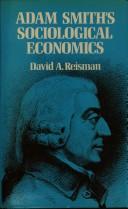
ISBN: 0856642843 0064958302 9780856642845 9780064958301 Year: 1976 Publisher: London Croom Helm
Abstract | Keywords | Export | Availability | Bookmark
 Loading...
Loading...Choose an application
- Reference Manager
- EndNote
- RefWorks (Direct export to RefWorks)
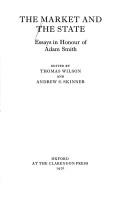
Abstract | Keywords | Export | Availability | Bookmark
 Loading...
Loading...Choose an application
- Reference Manager
- EndNote
- RefWorks (Direct export to RefWorks)
Economic order --- Economics --- Congresses --- Smith, Adam, --- Congresses. --- Economics - Congresses --- Smith, Adam, - 1723-1790 - Congresses --- Smith, Adam, - 1723-1790
Book
ISSN: 12965839 ISBN: 9782021384505 2021384500 Year: 2019 Publisher: Paris Éditions du Seuil
Abstract | Keywords | Export | Availability | Bookmark
 Loading...
Loading...Choose an application
- Reference Manager
- EndNote
- RefWorks (Direct export to RefWorks)
"Les défenseurs comme les critiques du capitalisme nous présentent habituellement Adam Smith comme le fondateur d'une doctrine selon laquelle la libre compétition des intérêts individuels engendrerait spontanément le maximum de bien-être collectif. Cette idée n'est pas partagée par les spécialistes de son œuvre car elle ne résiste pas à la critique historique. Ce livre montre notamment que la pensée d'Adam Smith a peu de rapports avec le libéralisme contemporain et que, par exemple, la fameuse « main invisible » n'y désigne pas les vertus autorégulatrices du marché. Smith est en réalité le premier auteur à proposer une analyse du capitalisme dont il découvre les trois dimensions : produit de l'histoire (la société commerciale), construction politique et intellectuelle (le système mercantile) et processus économique (l'accumulation du capital). Le capitalisme, à certaines conditions, permet l'enrichissement très inégal de tous, explique Smith, mais le système mercantile est injuste, car il est partial : il confond l'intérêt des marchands et l'intérêt général. Or, dit Smith, l'intérêt des marchands est « le plus souvent contraire » au bien commun. C'est ce que son analyse économique cherche à prouver. Le système mercantile est aussi responsable de la construction par la Grande-Bretagne d'un vaste empire colonial qui met en péril son régime constitutionnel remarquable hérité de la révolution de 1688 et qui risque de conduire à de nouvelles tyrannies. Quelles institutions permettront de tirer avantage du capitalisme en préservant la société des désastres que nourrit la logique mercantile ? Telle est la question ultime de Smith, dont l'œuvre ainsi resituée dans son contexte originel s'avère d'une étonnante qualité."
Capitalism --- Smith, Adam, --- Economic schools --- Smith, Adam --- Smith, Adam, - 1723-1790
Book
ISBN: 0192875582 0192875590 9780192875587 9780192875594 Year: 1985 Publisher: Oxford Oxford university press
Abstract | Keywords | Export | Availability | Bookmark
 Loading...
Loading...Choose an application
- Reference Manager
- EndNote
- RefWorks (Direct export to RefWorks)
Smith, Adam, --- 08 --- 330.44 --- AA / International- internationaal --- 330.8 --- 330.8 Economisch denken. Economische scholen. Economische theorieen --- Economisch denken. Economische scholen. Economische theorieen --- Biografieën en memoires --- Adam Smith --- Smith, Adam --- Smith, Adam, - 1723-1790 --- Smith (adam), 1723-1790 --- Biographie
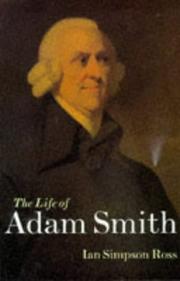
ISBN: 0198288212 9780198288213 Year: 1995 Publisher: Oxford Clarendon
Abstract | Keywords | Export | Availability | Bookmark
 Loading...
Loading...Choose an application
- Reference Manager
- EndNote
- RefWorks (Direct export to RefWorks)
Smith, Adam
---
Economists
---
Economistes
---
Biography
---
Biographie
---
Smith, Adam,
---
Biography.
---
-#BIBC:ruil
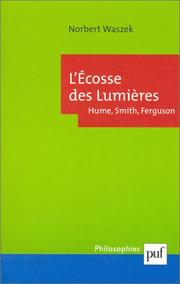
ISBN: 2130524494 9782130524496 Year: 2003 Volume: 161 Publisher: Paris PUF
Abstract | Keywords | Export | Availability | Bookmark
 Loading...
Loading...Choose an application
- Reference Manager
- EndNote
- RefWorks (Direct export to RefWorks)
Hume, David --- Ferguson, Adam --- Smith, Adam --- Hume, David, --- Smith, Adam, --- Ferguson, Adam, --- Criticism and interpretation --- Scotland --- Ecosse --- Intellectual life --- Vie intellectuelle --- Criticism and interpretation. --- Smith, Adam, - 1723-1790 --- Ferguson, Adam, - 1723-1816 --- Hume, David, 1711-1776 --- ECOSSE (GRANDE-BRETAGNE) --- SIECLE DES LUMIERES --- HUME (DAVID), PHILOSOPHE ANGLAIS, 1711-1776 --- SMITH (ADAM), 1723-1790 --- FERGUSON (ADAM), 1724-1800 --- VIE INTELLECTUELLE --- CRITIQUE ET INTERPRETATION --- 18E SIECLE --- Smith, Adam, - 1723-1790.
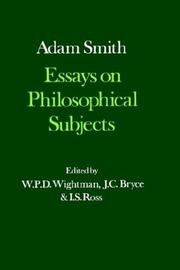
ISBN: 0198281870 9780198281870 Year: 1980 Volume: 3 Publisher: Oxford Clarendon
Abstract | Keywords | Export | Availability | Bookmark
 Loading...
Loading...Choose an application
- Reference Manager
- EndNote
- RefWorks (Direct export to RefWorks)
Philosophy --- Economics --- Classical school of economics --- Early works to 1800 --- Smith, Adam, --- #GROL:SEMI-1-05'17' --- Economics - Early works to 1800 --- Smith, Adam, - 1723-1790
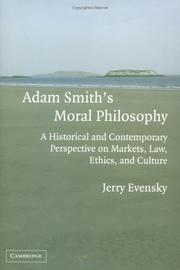
ISBN: 0521852471 0521703867 1107154391 9786611113162 0511344961 0511344600 0511568231 0511610645 1281113166 051134421X 0511345305 9780521852470 9780521703864 Year: 2005 Publisher: Cambridge Cambridge University Press
Abstract | Keywords | Export | Availability | Bookmark
 Loading...
Loading...Choose an application
- Reference Manager
- EndNote
- RefWorks (Direct export to RefWorks)
Adam Smith is the best known among economists for his book, The Wealth of Nations, often viewed as the keystone of modern economic thought. For many he has become associated with a quasi-libertarian laissez-faire philosophy. Others, often heterodox economists and social philosophers, on the contrary, focus on Smith's Theory of Moral Sentiments, and explore his moral theory. There has been a long debate about the relationship or lack thereof between these, his two great works. This work treats these dimensions of Smith's work as elements in a seamless moral philosophical vision, demonstrating the integrated nature of these works and Smith's other writings. This book weaves Smith into a constructive critique of modern economic analysis (engaging along the way the work of Nobel Laureates Gary Becker, Amarty Sen, Douglass North, and James Buchanan) and builds bridges between that discourse and the other social sciences.
Smith, Adam --- Economics --- Ethics --- Teleology --- Equality --- Moral and ethical aspects --- Smith, Adam, --- Criticism and interpretation --- Business, Economy and Management --- Economics - Moral and ethical aspects --- Smith, Adam, - 1723-1790 --- Smith, Adam, - 1723-1790 - Criticism and interpretation --- Smith, Adam, - 1723-1790. - Inquiry into the nature and causes of the wealth of nations --- Smith, Adam, - 1723-1790. - Theory of moral sentiments --- Ethics. --- Teleology. --- Equality. --- Moral and ethical aspects. --- Egalitarianism --- Inequality --- Social equality --- Social inequality --- Political science --- Sociology --- Democracy --- Liberty --- Design in natural phenomena, Study of --- Final cause --- Philosophy --- Causation --- Evolution --- Necessity (Philosophy) --- Deontology --- Ethics, Primitive --- Ethology --- Moral philosophy --- Morality --- Morals --- Philosophy, Moral --- Science, Moral --- Values --- Economic theory --- Political economy --- Social sciences --- Economic man --- Criticism and interpretation.
Book
ISBN: 9780691177014 0691177015 Year: 2017 Publisher: Princeton Princeton University Press
Abstract | Keywords | Export | Availability | Bookmark
 Loading...
Loading...Choose an application
- Reference Manager
- EndNote
- RefWorks (Direct export to RefWorks)
David Hume is widely regarded as the most important philosopher ever to write in English, but during his lifetime he was attacked as "the Great Infidel" for his skeptical religious views and deemed unfit to teach the young. In contrast, Adam Smith was a revered professor of moral philosophy, and is now often hailed as the founding father of capitalism. Remarkably, the two were best friends for most of their adult lives, sharing what Dennis Rasmussen calls the greatest of all philosophical friendships. The Infidel and the Professor is the first book to tell the fascinating story of the friendship of these towering Enlightenment thinkers--and how it influenced their world-changing ideas. The book follows Hume and Smith's relationship from their first meeting in 1749 until Hume's death in 1776. It describes how they commented on each other's writings, supported each other's careers and literary ambitions, and advised each other on personal matters, most notably after Hume's quarrel with Jean-Jacques Rousseau. Members of a vibrant intellectual scene in Enlightenment Scotland, Hume and Smith made many of the same friends (and enemies), joined the same clubs, and were interested in many of the same subjects well beyond philosophy and economics--from psychology and history to politics and Britain's conflict with the American colonies. The book reveals that Smith's private religious views were considerably closer to Hume's public ones than is usually believed. It also shows that Hume contributed more to economics--and Smith contributed more to philosophy--than is generally recognized. Vividly written, The Infidel and the Professor is a compelling account of a great friendship that had great consequences for modern thought.
Economic schools --- Hume, David --- Smith, Adam --- Philosophy, Modern --- Economists --- Philosophers --- Hume, David, --- Smith, Adam, --- Economists - Scotland - Biography --- Philosophers - Scotland - Biography --- Hume, David, - 1711-1776 --- Smith, Adam, - 1723-1790
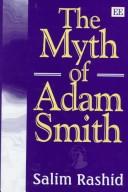
ISBN: 1858985323 9781858985329 Year: 1998 Publisher: Cheltenham Edward Elgar
Abstract | Keywords | Export | Availability | Bookmark
 Loading...
Loading...Choose an application
- Reference Manager
- EndNote
- RefWorks (Direct export to RefWorks)
Smith, Adam --- Economics --- Economie politique --- History --- Histoire --- Smith, Adam, --- AA / International- internationaal --- 330.43 --- Mercantilisme en fysiocratie. --- Economic theory --- Political economy --- Social sciences --- Economic man --- Mercantilisme en fysiocratie --- Smith, Adam, - 1723-1790
| Listing 1 - 10 of 39 | << page >> |
Sort by
|

 Search
Search Feedback
Feedback About UniCat
About UniCat  Help
Help News
News